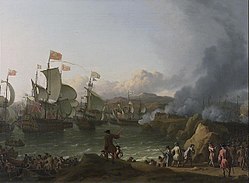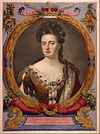User:Rincewind42/sandbox/Stuart period
| Stuart period | |||
|---|---|---|---|
| 1603–1714 | |||
 James VI of Scotland inherited the throne of England upon the death of Queen Elizabeth, becoming James I of England and founding the Stuart period. | |||
| Including | |||
| Monarch(s) | |||
Chronology
| |||
| Periods in English history |
|---|
| Timeline |
The Stuart period of British history usually refers to the period between 1603 and 1714 and sometimes from 1371 in Scotland. This coincides with the rule of the House of Stuart, whose first monarch was James VI of Scotland. The period ended with the death of Queen Anne and the accession of George I from the House of Hanover. The Stuart period was plagued by internal and religious strife.
Significant events of the period[edit]
English civil war - War of the Three Kingdoms[edit]



The English Civil War(s) took place during the reign of Charles I, the second Stuart monarch. The war ended in victory for the Parliamentarians. Charles was executed in 1649.
After this conflict, the line of Stuart monarchs was temporarily displaced by the Commonwealth of England. Their rule lasted from 1649 to 1660. Oliver Cromwell ruled directly from 1653 to 1659. After Cromwell's death the Commonwealth fell apart. The Convention Parliament welcomed Charles II, son of Charles I, to return from exile and become king. This event was known as the English Restoration.
Anglo Dutch Wars[edit]
The Anglo-Dutch Wars were a series of three wars which took place between the English and the Dutch from 1652 to 1674. English defeats forced Charles II to sign for peace and led to Dutch domination of sea trading routes until 1713.[1]
Popish Plot[edit]
The Popish Plot (1678) was an alleged Catholic conspiracy concerning a fictitious manuscript which accused the Roman Catholic Church of approving an assassination of Charles II. The plot led to anti-Catholic hysteria in England and the executions of approximately 35 innocent persons.[2]
Timeline[edit]
- 1603-1625
- 1625-1642
- 1642-1651
- 1651-1660
- 1660
- 1688
Monarchs[edit]
 England
England  King James I : 1533–1603
King James I : 1533–1603  Scotland
Scotland 
| 16. John Stewart, 3rd Earl of Lennox | |||||||||||||||||||
| 8. Matthew Stewart, 4th Earl of Lennox | |||||||||||||||||||
| 17. Elizabeth Stewart | |||||||||||||||||||
| 4. Henry Stuart, Lord Darnley | |||||||||||||||||||
| 18. Archibald Douglas, 6th Earl of Angus | |||||||||||||||||||
| 9. Margaret Douglas | |||||||||||||||||||
| 19. Margaret Tudor | |||||||||||||||||||
| 2. James I of England | |||||||||||||||||||
| 20. James IV of Scotland | |||||||||||||||||||
| 10. James V of Scotland | |||||||||||||||||||
| 21. = 19. Margaret Tudor | |||||||||||||||||||
| 5. Mary I, Queen of Scots | |||||||||||||||||||
| 22. Claude, Duke of Guise | |||||||||||||||||||
| 11. Marie de Guise | |||||||||||||||||||
| 23. Antoinette de Bourbon | |||||||||||||||||||
| 1. Henry Frederick | |||||||||||||||||||
| 24. Frederick I of Denmark | |||||||||||||||||||
| 12. Christian III of Denmark | |||||||||||||||||||
| 25. Anna of Brandenburg | |||||||||||||||||||
| 6. Frederick II of Denmark | |||||||||||||||||||
| 26. Magnus I, Duke of Saxe-Lauenburg | |||||||||||||||||||
| 13. Dorothea of Saxe-Lauenburg | |||||||||||||||||||
| 27. Catherine of Brunswick-Lüneburg | |||||||||||||||||||
| 3. Anne of Denmark | |||||||||||||||||||
| 28. Albert VII, Duke of Mecklenburg-Güstrow | |||||||||||||||||||
| 14. Ulrich III of Mecklenburg-Schwerin | |||||||||||||||||||
| 29. Anna of Brandenburg | |||||||||||||||||||
| 7. Sophie of Mecklenburg-Güstrow | |||||||||||||||||||
| 30. Frederick I of Denmark | |||||||||||||||||||
| 15. Elizabeth of Denmark | |||||||||||||||||||
| 31. Sophie of Pomerania | |||||||||||||||||||

King of England and Ireland as James I from 1603 to 1625.
King of Scots as James VI in 1567 aged thirteen months
succeeding his mother Mary, Queen of Scots.
Anne of Denmark (1574–1619) was Queen Consort to King James VI and I.
 England
England  Queen Anne : 1665-1714
Queen Anne : 1665-1714  Scotland
Scotland 
| 16. Henry Stuart, Lord Darnley | |||||||||||||||||||
| 8. James I of England | |||||||||||||||||||
| 17. Mary I of Scotland | |||||||||||||||||||
| 4. Charles I of England | |||||||||||||||||||
| 18. Frederick II of Denmark | |||||||||||||||||||
| 9. Princess Anne of Denmark | |||||||||||||||||||
| 19. Sofie of Mecklenburg-Schwerin | |||||||||||||||||||
| 2. James II of England | |||||||||||||||||||
| 20. Antoine of Bourbon, Duke of Vendôme | |||||||||||||||||||
| 10. Henry IV of France | |||||||||||||||||||
| 21. Jeanne III of Navarre | |||||||||||||||||||
| 5. Princess Henrietta Maria of France | |||||||||||||||||||
| 22. Francesco I de' Medici, Grand Duke of Tuscany | |||||||||||||||||||
| 11. Marie de' Medici | |||||||||||||||||||
| 23. Archduchess Johanna of Austria | |||||||||||||||||||
| 1. Anne of Great Britain | |||||||||||||||||||
| 24. Lawrence Hyde | |||||||||||||||||||
| 12. Henry Hyde | |||||||||||||||||||
| 25. Anne Sibell | |||||||||||||||||||
| 6. Edward Hyde, 1st Earl of Clarendon | |||||||||||||||||||
| 26. Edward Langford | |||||||||||||||||||
| 13. Mary Langford | |||||||||||||||||||
| 27. Mary Hyde | |||||||||||||||||||
| 3. Anne Hyde | |||||||||||||||||||
| 28. William Aylesbury | |||||||||||||||||||
| 14. Thomas Aylesbury | |||||||||||||||||||
| 29. Anne Poole | |||||||||||||||||||
| 7. Frances Aylesbury | |||||||||||||||||||
| 30. Francis Denman | |||||||||||||||||||
| 15. Anne Denman | |||||||||||||||||||
| 31. Anne Blount | |||||||||||||||||||


When James II was deemed abdicated during the Glorious Revolution (1688-89).
her sister and brother-in-law became joint monarchs William III and Mary II.
After Mary's death in 1694, William was monarch until his death in 1702.
Anne reigned until 1714 as last Stuart Queen of England and of the Scots.
| Periods in English history |
|---|
| Timeline |
The House of Stuart produced six English monarchs who ruled during this period.
The early Stuarts.
- King James I (1603 to 1625).
- King Charles I (1625 to 1649).
The late Stuarts.
- King Charles II (1660 to 1685).
- King James II (1685 to 1688).
- Queen Mary II (1689 to 1702). Reigned with William III of House of Orange-Nassau.
- Queen Anne (1702 to 1714)
Government[edit]
Plots, intrigues and conspiracies[edit]
Colonising the New World[edit]
Civil War[edit]
Interregnum[edit]
Restoration[edit]
Union of Parliament[edit]
Distinctions[edit]
Religion[edit]
Science, technology and exploration[edit]
Education[edit]
Gender[edit]
Food[edit]
High culture[edit]
Theatre[edit]
Music[edit]
Fine arts[edit]
Popular culture[edit]
Sports and entertainment[edit]
Festivals, holidays and celebrations[edit]
See also[edit]
References[edit]








